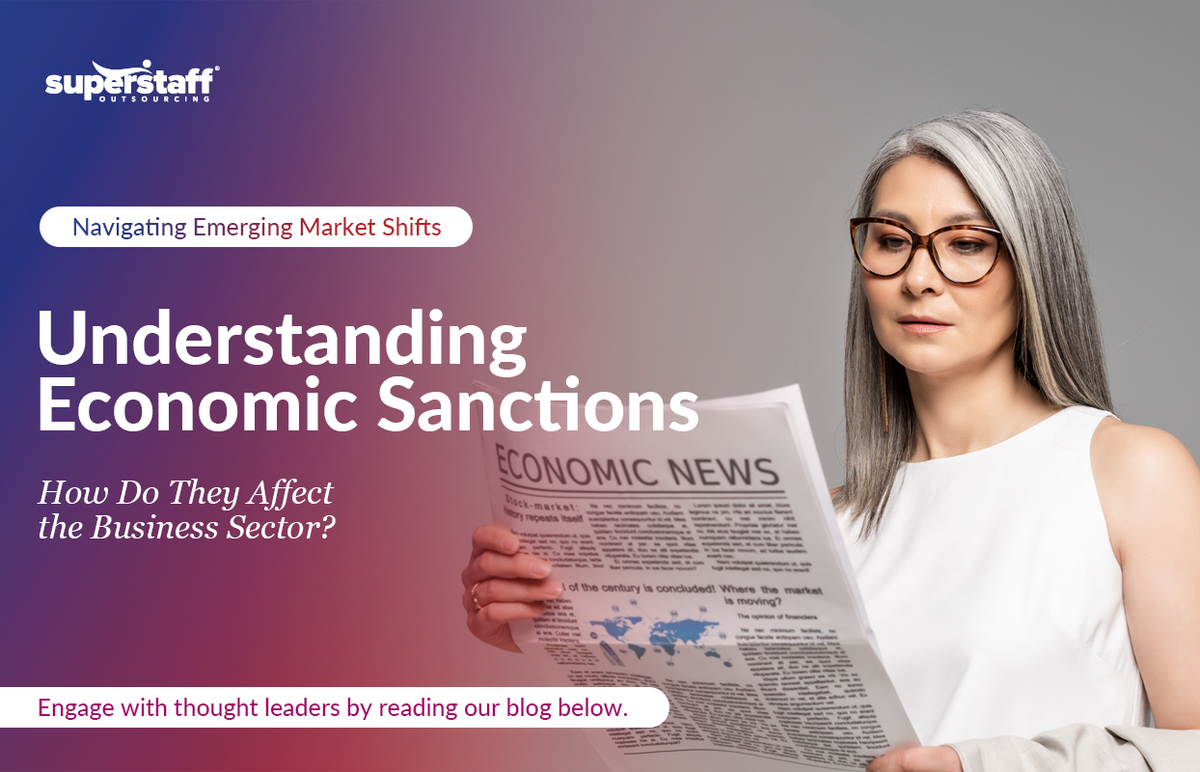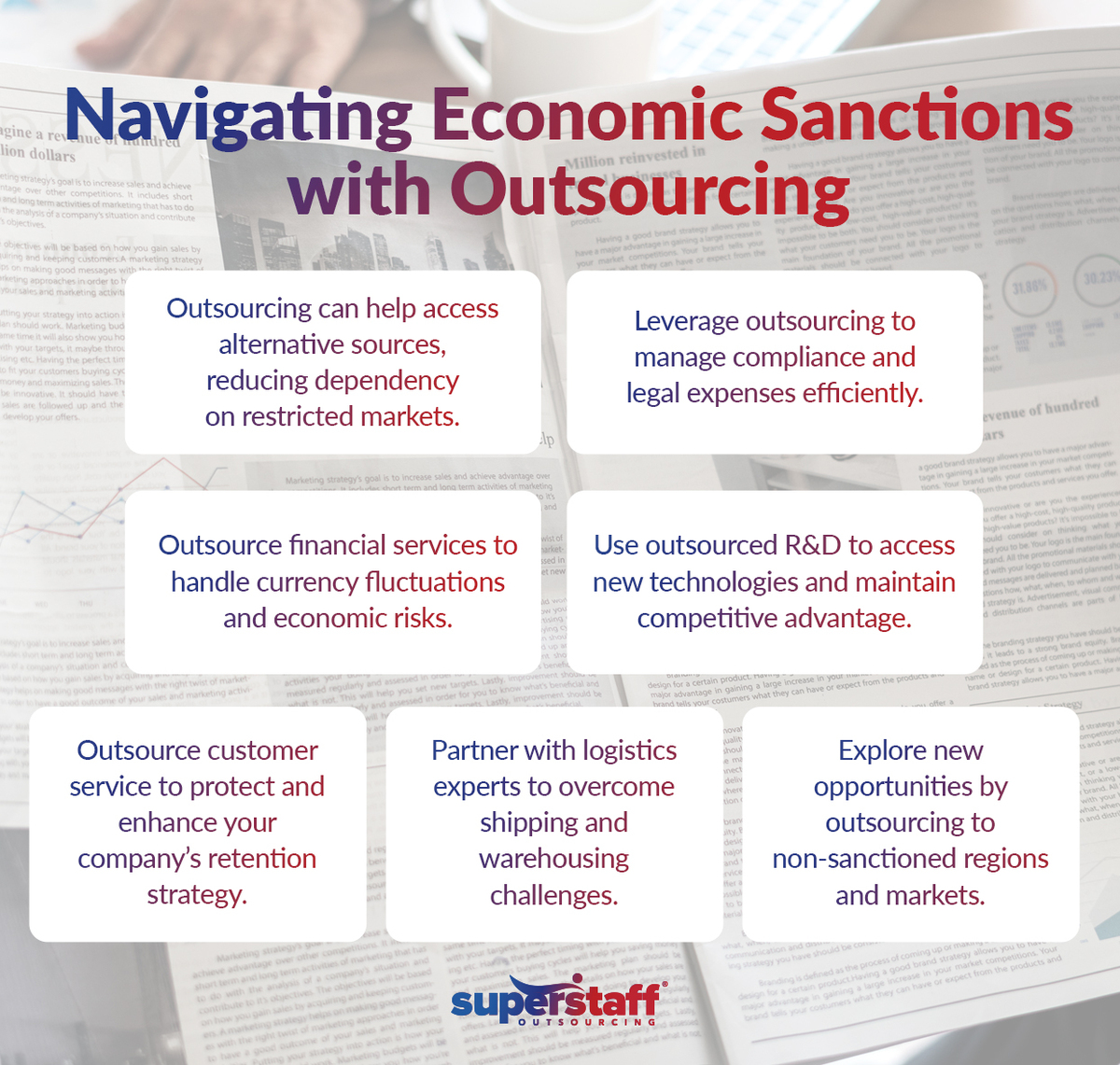
Economic sanctions are not just diplomatic weapons — they’re business disruptors that can shake even the most stable companies.
For C-suite executives, the stakes are high: sanctions can cripple supply chains, drive up operational costs, and restrict market access, all while damaging hard-earned reputations. As global trade tightens, businesses must be agile, adaptable, and well-prepared for the ripple effects of sanctions.
In this article, we’ll explore seven critical ways sanctions can undermine your business and offer strategies to navigate these disruptions while safeguarding profitability and growth in an increasingly volatile global landscape.
What are Economic Sanctions?
Before going any further, let’s first discuss what is an economic sanction.
Economic sanctions are powerful tools in global diplomacy that can reshape a nation’s behavior by cutting off its economic lifelines. These measures — from trade bans to financial freezes and travel restrictions — are designed to pressure governments or entities by stifling their economic activities. The goal is to push them towards compliance with international standards or to address specific grievances.
The effects of sanctions on the targeted nation can be dramatic and multifaceted. Economically, they can trigger a cascade of issues, such as skyrocketing inflation, plummeting trade volumes, and declining living standards for ordinary people. Politically, sanctions aim to stir internal unrest by eroding public support for the government and fueling dissatisfaction, potentially leading to shifts in policy or leadership.
On the global stage, sanctions can ripple, affecting international relations and economic landscapes. Nations under sanctions might forge new alliances or adjust their financial strategies to mitigate the impact, which can reshape global market dynamics and influence geopolitical alignments. Understanding the reach and repercussions of sanctions is crucial for grasping their role in international affairs and their broader impact on global business.

Navigating Restricted Market Access
Economic sanctions, especially those imposed by powerful economies like the U.S., have a far-reaching impact on global trade and business operations. They don’t just limit market access — they can shake entire industries, cut off vital resources, and force businesses to rethink their strategies.
Below, we dive into critical examples of U.S. sanctions that demonstrate just how profoundly these restrictions can reshape industries and economies worldwide.
U.S. Embargo on Cuba
The U.S. embargo on Cuba, one of the longest-running sanctions regimes in history, has drastically limited Cuba’s access to American goods, services, and capital since the 1960s. What began as an arms trade ban became a total trade embargo, cutting off nearly all business ties between the two nations.
For over six decades, this embargo has left U.S. businesses wholly shut out of the Cuban market. Industries like energy, healthcare, and telecommunications have particularly felt the sting as investment opportunities and trade routes have vanished. Meanwhile, Cuba has had no choice but to seek alternative trading partners, forever altering its economic landscape.
Sanctions on Iran
When the U.S. withdrew from the Joint Comprehensive Plan of Action (JCPOA) in 2018, it imposed severe sanctions on Iran, targeting the country’s lifeblood—its oil exports. These sanctions have crippled Iran’s ability to sell oil on the global market and have blocked its access to the international financial system.
Energy companies, in particular, have been hard-hit, facing skyrocketing operational costs and diminished revenue streams as they lose access to Iran’s oil. The once-thriving trade relations have been reduced to a trickle, leaving businesses to find alternative markets or risk severe penalties.
Sanctions on North Korea
Following North Korea’s controversial nuclear tests, the U.S. enacted stringent sanctions that essentially locked the country out of international markets. These sanctions target military goods and dual-use technologies while blocking North Korea from participating in the global financial system.
The result? Near-total economic isolation. Engaging with North Korea is off the table for businesses in the technology and defense sectors. The sanctions have made trade with the country difficult and nearly impossible, creating a heavily fortified barrier to any global partnerships.
Economic Sanctions on Russia
Russia has faced waves of U.S. sanctions, particularly in response to its annexation of Crimea and its military actions in Ukraine. These sanctions have targeted Russia’s most vital industries: finance, energy, and defense. Russian financial institutions now struggle to secure loans from U.S. lenders, while its energy sector — crucial to the country’s economy — has been cut off from advanced U.S. drilling technology. U.S. companies that once saw opportunities in Russia’s vast market have had to reconsider their strategies as sanctions sever access to resources and revenue.
The Business Impact: Navigating Barriers and Complexities
From Cuba’s decades-long embargo to the more recent sanctions on Iran, North Korea, and Russia, the message is clear: sanctions don’t just target countries — they reshape global industries. These restrictions create steep barriers for businesses, forcing them to navigate complex regulatory landscapes, reassess supply chains, and absorb the added costs of finding new markets and partners.
For companies operating in globally interconnected sectors like energy, technology, and finance, understanding and adapting to sanctions is essential for survival in today’s volatile global marketplace.
Sanctions aren’t just about politics—they’re about the survival and adaptation of industries that rely on global markets. For businesses, staying ahead means learning to navigate the intricacies of sanctions while keeping operations afloat in an increasingly restricted world.
Increasing Operational Costs for Businesses
Often wielded as tools of political leverage, sanctions also have a profound ripple effect on businesses navigating today’s interconnected global economy. These measures can translate into significantly higher operational costs for multinational corporations, impacting everything from compliance to labor expenses. In this section, we’ll delve into how sanctions drive these costs and what it means for businesses striving to maintain profitability.
Increased Compliance Costs
The first and most immediate challenge businesses face under sanctions is the intricate web of compliance requirements. Multinational companies, in particular, must allocate substantial resources to legal and compliance teams to avoid running afoul of sanctions. This involves rigorous due diligence on transactions, suppliers, and customers to ensure no sanctioned entities are engaged in their operations.
The financial strain of compliance is considerable. Companies must invest in robust internal controls, including sanctions screening tools and comprehensive legal reviews, to minimize the risk of hefty penalties. For sectors like finance, energy, and technology, where regulatory demands are particularly stringent, these costs can quickly spiral, significantly impacting overall profitability. The administrative burden alone—staying current with ever-evolving regulations—can be overwhelming and expensive.
Increased Labor Costs and Job Losses
In export-heavy industries, US economic sanctions can also indirectly impact labor costs. For example, if a company loses access to international markets, it may experience decreased product demand, leading to job cuts.
When exports decline, labor needs decrease, resulting in wage stagnation or even reductions. In the U.S., economic sanctions in the 1990s led to the loss of more than 200,000 jobs in the export sector. These effects can ripple through industries highly dependent on foreign sales and international partnerships.
Additionally, sanctions can increase labor costs in industries that require specialized compliance and risk management expertise. As sanctions become more complex, businesses may need additional legal and regulatory personnel, further driving up operational costs.
Long-term Effects on Business Relationships
Even after sanctions are lifted, the long-term effects can continue to impact businesses. Sanctioned markets may view companies that complied with sanctions as unreliable or unwilling to engage in future trade. Re-establishing relationships with these markets can be challenging, leading to lost business opportunities and increased costs in rebuilding trust and market share.
This long-term competitive disadvantage can mean higher operational costs as companies try to regain their footing in previously closed markets. The perception of unreliability can also affect potential partnerships with other international players who hesitate to engage with a company that has a history of being affected by sanctions.
Disrupting Global Supply Chains
Beyond affecting a company’s ability to trade internationally, sanctions also disrupt supply chains, making it more challenging to access essential raw materials and increasing the cost of operations.
Businesses relying on global supply networks face considerable obstacles as sanctions cut off access to key suppliers, complicate logistics, and create legal challenges.
This section will explore how sanctions disrupt supply chains and how these disruptions affect businesses.
Disruption of Supply Flow
Sanctions can cut off access to critical raw materials and components, halting supply chains and forcing companies to find alternatives. For example, sanctions on countries like Russia have severely restricted the availability of essential raw materials such as metals, energy products, and other commodities. These disruptions ripple across industries, affecting manufacturing, energy production, and technology development.
Without access to critical materials, companies often turn to more expensive or less reliable suppliers, driving up production costs and slowing down operations. For businesses dependent on just-in-time inventory systems, even minor disruptions can lead to significant delays, missed production deadlines, and an inability to meet customer demand.
Increased Costs of Compliance
Beyond raw material shortages, businesses must also adhere to complex compliance regulations to avoid violating sanctions. These regulations require enhanced screening and due diligence on suppliers, financial transactions, and logistics partners. As companies devote more resources to compliance efforts, operational costs inevitably rise.
Ensuring compliance with sanctions can also cause delays in supply chain operations. Companies may need to hold shipments, conduct additional inspections, or reroute goods to ensure no sanctioned entities are involved in their transactions. This can compound the cost and time it takes for goods to reach their final destination, reducing operational efficiency and increasing overall expenses.
Market Reorientation
Sanctions can also create legal challenges within supply chains, especially when businesses are contractually tied to suppliers or customers in sanctioned countries. These contracts may become difficult or impossible to fulfill, leading to breaches and potential legal disputes.
For instance, a company with long-standing contracts in a sanctioned country may face lawsuits or financial penalties for non-performance if sanctions prevent them from fulfilling their obligations. This adds another financial and legal risk layer to a strained supply chain.
Legal Complications
Even companies not directly involved with sanctioned countries can feel the ripple effects of supply chain disruptions. If a critical supplier or logistics partner is subject to sanctions, non-sanctioned businesses may experience delays, increased costs, or reputational risks by association.
Indirect Impacts on Non-Sanctioned Entities
Even companies not directly involved with sanctioned countries can feel the ripple effects of supply chain disruptions. If a key supplier or logistics partner is subject to sanctions, non-sanctioned businesses may experience delays, increased costs, or reputational risks by association.
These indirect effects can particularly damage businesses that rely on global supply chains. One supplier’s inability to fulfill orders due to sanctions can cause cascading disruptions throughout the supply chain, leading to widespread operational challenges.
Sanctions have severed global supply chains, cutting off access to critical materials, complicating logistics, and introducing legal challenges. Businesses must navigate these complexities while contending with rising costs from alternative suppliers and compliance efforts.
For companies engaged in international trade, understanding these risks and finding ways to mitigate them is essential to maintaining stability and profitability in a sanctions-driven environment.
The Ripple Effect of Sanctions on Financial Markets
Sanctions, while often designed to exert political pressure, can have far-reaching effects on financial markets. By destabilizing currencies and influencing stock market performance, sanctions create a turbulent environment for companies engaged in international trade. Let’s dive into how sanctions fuel financial market volatility and what this means for businesses.
Increased Uncertainty and Risk Aversion
Sanctions introduce significant economic and political uncertainty, which can make investors jittery. This heightened risk increases stock price volatility, bond yields, and currency exchange rates. Investors often react by adjusting their portfolios, leading to sharp fluctuations as they seek to mitigate potential losses.
Disruption of Financial Flows
When sanctions are imposed, they restrict the movement of capital, goods, and services between the sanctioned country and the global economy. This disruption can cause dramatic shifts in asset prices and exchange rates as financial markets scramble to adapt to the new economic realities.
Impact of Sanctions Announcements
The announcement of new sanctions or the expansion of existing ones often triggers immediate market reactions. Stocks of companies with ties to the sanctioned region can experience significant price swings, reflecting investor concerns and the potential impacts on these businesses.
Contagion Effects
Sanctions on a significant economy can have ripple effects on other countries with strong economic connections to the sanctioned nation. This contagion effect can spread financial instability, leading to broader market volatility and further impacting businesses globally.
The Revenue Fallout: How Sanctions Squeeze Businesses
As businesses grapple with market share declines and contract cancellations, they face significant revenue losses. These financial setbacks are compounded by increased competition from non-sanctioned regions and reputational risks associated with being linked to sanctioned areas. Let’s delve into some real-world examples that highlight the severe revenue impact of sanctions.
Venezuela’s Oil Revenue Crisis
When the U.S. imposed sanctions on Venezuela in 2017, the country faced a severe revenue shortfall. The restrictions on trading Venezuelan oil — one of the nation’s primary sources of income — led to a staggering $6 billion loss in oil revenue. This shortfall not only disrupted Venezuela’s ability to import essential goods like food and medicine but also devastated its economy, showcasing how sanctions can cripple vital revenue streams.
The Strain on Russia’s Energy Sector
Following its invasion of Ukraine, Russia experienced significant revenue losses due to Western sanctions targeting its oil and gas industry. In 2023, revenues from these sectors dropped by 24% compared to the previous year. To offset this decline, the Russian government had to consider increasing taxes on the oil and gas industry, highlighting how sanctions can force governments to implement costly measures to compensate for lost revenue.
U.S. Export Sector Setbacks
On a broader scale, U.S. economic sanctions have led to substantial losses in export revenues. Estimates suggest that sanctions have cost the U.S. between $15 billion and $19 billion in lost merchandise exports to targeted countries. This revenue loss has translated into over 200,000 job reductions in the export sector and a nearly $1 billion decline in wage premiums, illustrating the far-reaching economic consequences of sanctions.
H&M’s Revenue Decline
In a different context, H&M experienced a $74 million revenue decline after deciding to halt cotton sourcing from Xinjiang due to forced labor concerns. The move led to a significant backlash from Chinese consumers, resulting in a 23% drop in sales year-on-year. This example underscores how sanctions-related decisions can provoke consumer reactions that negatively impact a company’s financial performance.
The financial impact is often severe, whether through restricted trade, market disruptions, or consumer backlash. Companies must navigate these challenges carefully, balancing the need to comply with sanctions against the risk of losing market share and revenue.
Beyond the direct financial losses, businesses also confront reputational risks, which can further complicate their ability to recover and thrive in the global marketplace. Understanding these dynamics is crucial for any company operating in or around sanctioned regions as they work to mitigate the financial fallout and navigate the complex landscape of international trade.
Reputation on the Line: The Long-Term Impact of Sanctions on Corporate Image
Aside from economic restrictions, sanctions deliver a decisive blow to a company’s reputation. As businesses navigate the complex compliance landscape and operational challenges, their public image often suffers, leading to long-term consequences that can ripple through customer relationships and investor confidence.
Automaker Compliance Violations and Coverup
One of the most striking examples of reputation damage from sanctions involves an automaker found to have installed emissions software designed to pass regulatory tests while allowing up to 40 times the EPA’s limit for exhaust emissions during regular driving. Discovered by the U.S. Environmental Protection Agency (EPA), this violation led to:
- The company set aside $10 billion for an international recall program.
- The loss of its “Green Car of the Year” designation severely undermined its environmentally friendly brand image.
- Posting its first quarterly loss in 15 years.
- Significant fines to settle criminal and civil suits with the U.S. Department of Justice.
This scandal tarnished the automaker’s reputation and resulted in steep financial costs, showcasing how compliance failures can erode brand trust.
Food and Beverage Company Advertising Misstep
Sanctions-related reputation damage can also stem from marketing blunders. A food and beverage company invested over $5 million in an ad campaign that trivialized a sensitive social issue, leading to:
- Negative brand mentions skyrocketing to over 55%.
- A drop in positive sentiment on social media to -12%, compared to a 2% net positive sentiment before the ad aired.
- Nine months of the lowest brand perception levels in a decade.
This example highlights how a single advertising misstep can lead to prolonged reputational damage and a significant decline in brand perception.
Sanctions Enforcement Actions Tarnishing Corporate Reputations
Sanctions enforcement actions by the U.S. Office of Foreign Assets Control (OFAC) have targeted prominent companies like Microsoft, Wells Fargo, Berkshire Hathaway, and Amazon. These high-profile cases demonstrate how sanctions violations can significantly damage corporate reputations. The negative publicity often results in reputational costs that can reach the millions or tens of millions of dollars, far exceeding the financial penalties imposed.
These examples underscore the severe impact of sanctions violations and compliance failures on a company’s reputation. Losing customers’, investors’, and public trust can have significant financial and operational consequences.
The reputational risks associated with sanctions can have lasting effects, from damaging the brand image and triggering consumer backlash to eroding investor confidence and complicating partnerships. Companies must navigate these challenges carefully, balancing compliance with maintaining a positive public image and stakeholder trust. Understanding and mitigating reputational risks are crucial for international trade and sanctions businesses.
Innovation and R&D Challenges: The Hidden Costs of Sanctions
Sanctions can do more than disrupt markets and limit trade; they can also stifle innovation and hamper research and development (R&D) efforts. By restricting access to cutting-edge technology and skilled talent, sanctions create significant obstacles for businesses striving to push the envelope of technological advancement.
Reduced Access to Technology and Expertise
Sanctions often limit access to advanced technologies and specialized expertise from sanctioned countries or regions. This can severely hinder a firm’s ability to develop or enhance new products. For example, U.S. sanctions can restrict access to American-made high-tech equipment and software essential for cutting-edge R&D. As a result, companies in targeted regions may struggle to keep pace with global technological advancements.
Loss of Partnerships and Collaboration
Sanctions can isolate firms from global innovation networks by making it risky for foreign entities to engage in joint R&D projects. Without the ability to collaborate with international partners, targeted firms miss out on valuable opportunities for knowledge exchange and technological advancement. This isolation can hinder their ability to innovate and stay competitive globally.
Reallocation of Resources
Faced with sanctions pressures, companies may need to shift their focus from long-term R&D to short-term survival. The need to adapt to new regulatory environments and manage immediate operational challenges often leads firms to reallocate resources away from innovation efforts. This short-term focus can undermine their long-term growth and technological advancement.
Challenges Accessing Global Markets
Sanctions also complicate access to global markets, making it difficult for firms to sell innovative products. Limited market access reduces the potential returns on R&D investments, discouraging further innovation. Companies that cannot capitalize on their technological breakthroughs due to market restrictions face diminished incentives to continue investing in research and development.
Sanctions present substantial challenges to innovation and R&D by restricting access to technology, disrupting supply chains, increasing compliance costs, and isolating firms from global partnerships. The consequences of these restrictions are felt across various industries, impacting their ability to innovate and grow.
For companies operating in sanctioned regions, finding alternative solutions and adapting to these constraints is crucial for sustaining their R&D efforts and staying competitive in the global market.
Navigate the Evolving Landscape Brought About by Economic Sanctions

Understanding the implications of sanctions, from disrupting supply chains to altering market dynamics, is crucial for navigating today’s complex economic landscape. Staying informed about how sanctions affect your industry can help you adapt strategies, manage risks, and seize new opportunities.
At SuperStaff, we’re committed to providing the latest insights and expert analysis on economic sanctions and their effects on the business sector. Our in-depth coverage helps you stay updated on regulatory changes and emerging trends that could influence your operations and strategic planning.
Don’t let the evolving landscape of economic sanctions catch you off guard. Follow SuperStaff on LinkedIn and subscribe to our newsletter for timely updates and expert perspectives delivered straight to your inbox. Equip yourself with the knowledge you need to navigate the complexities of economic sanctions and keep your business positioned for success.






